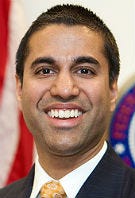Boost Mobile Sale Among New T-Mobile-Sprint Merger ConcessionsBoost Mobile Sale Among New T-Mobile-Sprint Merger Concessions
One critic calls FCC Commissioner Ajit Pai, who voiced support for the merger, as taking "smug pleasure in being a blatant telecom shill."

Federal Communications Commission (FCC) Chairman Ajit Pai on Monday announced his support for the proposed T-Mobile-Sprint merger after the companies said they would take a “series of significant steps” if their merger application is approved.
This comes after U.S. Department of Justice staffers last month told T-Mobile US and Sprint that their planned $26 billion mega-merger is unlikely to be approved as currently structured. The department’s antitrust division is considering whether the merger would pose an unacceptable threat to competition.
The FCC began its review of the merger last June.

FCC’s Ajit Pai
“Two of the FCC’s top priorities are closing the digital divide in rural America and advancing United States leadership in 5G, the next generation of wireless connectivity,” Pai said. “The commitments made today by T-Mobile and Sprint would substantially advance each of these critical objectives.”
The companies have committed to deploying a 5G network that would cover 97% of the U.S. population within three years of the closing of the merger, and 99% of Americans within six years, he said. This network also would reach deeply into rural areas, with 85% of rural Americans covered within three years and 90% covered within six years, he said.
Additionally, T-Mobile and Sprint have guaranteed that 90% of Americans would have access to mobile broadband service at speeds of at least 100 Mbps and 99% would have access to speeds of at least 50 Mbps, Pai said.
“The construction of this network and the delivery of such high-speed wireless services to the vast majority of Americans would substantially benefit consumers and our country as a whole,” he said. “I’m also pleased that the companies have committed to a robust build-out of their midband spectrum holdings. Demonstrating that 5G will indeed benefit rural Americans, T-Mobile and Sprint have promised that their network would cover at least two-thirds of our nation’s rural population with high-speed, midband 5G, which could improve the economy and quality of life in many small towns across the country.”
Keep up with the latest channel-impacting mergers and acquisitions in our M&A roundup. |
Sprint will divest its low-cost Boost Mobile wireless company, and that new company will promise to offer better prices than those currently offered by T-Mobile or Sprint for three years following the deal’s closing. In addition, the companies agreed to pay the FCC up to $2.4 billion in fines if they violate the agreement.
“In light of the significant commitments made by T-Mobile and Sprint as well as the facts in the record to date, I believe that this transaction is in the public interest and intend to recommend to my colleagues that the FCC approve it,” Pai said. “This is a unique opportunity to speed up the deployment of 5G throughout the United States and bring much faster mobile broadband to rural Americans. We should seize this opportunity.”
The commitments made to the FCC didn’t appease opponents of the merger. Fight for the Future said the merger would reduce the number of national wireless carriers from four to three, leading to “higher prices and …
… worse plans, with the biggest impact felt by low-income people and communities of color.” The nonprofit organization’s mission is to “ensure that the web continues to hold freedom of expression and creativity at its core.”
“Ajit Pai doesn’t even try to pretend that he works for the public, said Evan Greer, Fight for the Future’s deputy director. “He seems to take smug pleasure in being a blatant telecom shill. No one is surprised by today’s announcement, but we will keep fighting to block this merger –– which simply put will lead to crappier, more expensive internet for millions of people.”
The Communications Workers of America (CWA) said the proposed merger remains anticompetitive and “harmful to American workers,” and should be blocked.
“These new commitments and conditions do nothing to address our concerns about the impact of this merger on T-Mobile and Sprint workers and consumers,” said Debbie Goldman, the CWA’s research and telecommunications policy director. “The merger would mean the elimination of 30,000 U.S. jobs as the new T-Mobile shuts down duplicative retail stores and consolidates headquarters functions. T-Mobile has made no written, verifiable commitments to the FCC to protect jobs. While T-Mobile has tried to muddy the waters with vague loophole-ridden pledges to maintain jobs for current T-Mobile and Sprint employees, three-quarters of current employees selling the companies’ services work for authorized dealers and are not covered by the jobs pledge — 88,000 workers in total.”
The companies’ rural promises also are “overstated and don’t hold up to scrutiny,” she said.
“T-Mobile and Sprint’s own filings with the FCC show that even five years after the merger, 40 million Americans – mostly in rural communities – would still not have access to the New T-Mobile’s high-speed 5G wireless network,” Goldman said.
Read more about:
AgentsAbout the Author
You May Also Like


